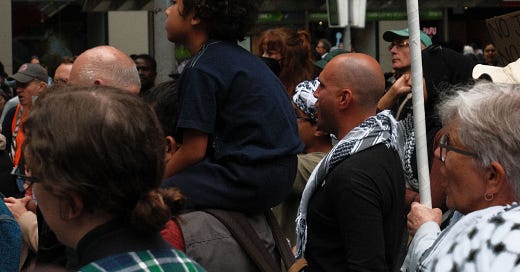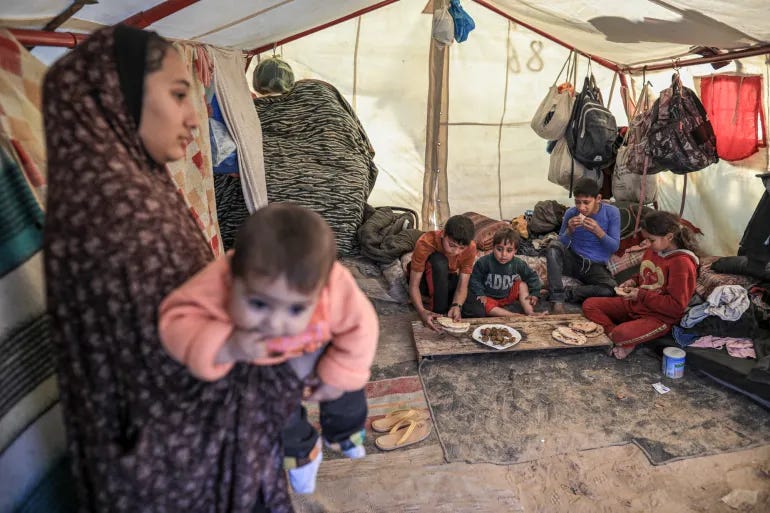You have not read from me in a month; this was not a deliberate thing but rather a necessity due to an increasingly overloaded schedule. However, I would like to try a less-frequent posting schedule, as I discussed in my podcast episodes, with fewer words. This is not because I want to write less, but rather because common feedback was that I had written too much for people to stay up-to-date with. Please never feel compelled to read my articles; they are there for you to enjoy and read at your own pace, whenever you please.
This article is on a very specific event in recent weeks during the genocide of the Palestinian people that has resonated particularly with me, as someone who has read about the family involved many times in the past and wishes for this story not to be forgotten. And with that, we may begin.
In the Name of Allah, the Lord of Mercy, the Giver of Mercy
The Levant-based Yazji family in the 19th century were among the pioneers of the push towards a reinvention of Standard Arabic, a language that needed a renovation to maintain its utility in a world rapidly developing so that formal Arabic would not fall behind, and by extension, the Arab peoples.
This movement, called the Nahda (النهضة), meaning ‘the awakening,’ was a movement led by the Arab bourgeoise, who were influenced by the growth of imperialism and nationalism in the West and disheartened by the Ottoman Empire’s dwindling authority, for by this point Egypt had been all but independent, paying lip service only to the Empire. The Levant was not so lucky, having remained under the thumb of the Empire as a source of conscripts due to its proximity to the heart of the Empire.
So the Nahda diverged; in Egypt, it was preoccupied with societal and political ambitions: restructuring of the political state and Islam, the ebb and flow of secularist ideas, the ambitions for a Westernised education and bureaucracy, and the questioning of religious precedent and Fiqh. It is in 19th- and 20th-century Egypt that one finds a wealth of ideas, debates, and questions that have yet to be repeated again. For every ideology, within reason, you will find its supporters and haters in this period of Egyptian intellectual history.
But it is in the Levant that the language and the culture find their rebirth. One of the earlier proponents of the Nahda, Nassif Al Yazji, completed the first translation of the Bible into ‘Modern’ standard Arabic as a testament to the rich potential of ‘Modern’ Arabic, an update on the older translation from Andalusian translators, which had begun to, like the Qur’an, have its own Arabic variant embedded in its time with sayings that do not translate directly to the present, requiring years of studying to be fully comprehendible to an Arab at the time. Nassif’s translation at his time became the most widely distributed copies of the Bible in Arabic, a testament to his mastery of the Arabic language, along with that of his collaborators (Cornelius Van Dyke and Boutros Al-Bustani).
It was then Nassif’s son, Ibrahim, who improved on his father’s translation, as he had dedicated his life to mastering not only Arabic but Syriac and Hebrew. Ibrahim, who created his own Arabic font designed for mass printing, was able to create the standard Arabic-language Bible translation.
Ibrahim’s translation, one of the most poetic works and the second major work, completed in Modern Standard Arabic (his father’s translation being the first major work), has remained among the most used and distributed copies of the Arabic Bible. If you read the Bible in Arabic, it is very likely you are reading Ibrahim’s translation, or a translation derived from his. It is Ibrahim’s translation that retains a flow familiar to Muslim-Arabs in his efforts to introduce a flow he found missing in his father’s translation but present in the ancient manuscripts he studied.
The Al-Yazji family, including Ibrahim’s other siblings like Habib, Warda, and Khalil, were at the very forefront of the Arabic language reformation. All the children of Nassif completed works of poetry, theatre, stories, and literature in the Modern Arabic language they were innovating.
So it is in this context that the Al-Yaziji family finds fame as the pioneers of a new standard for Arabic.
Al-Yazji, in Arabic written as اليازجي, means ‘The Clerk’, or ‘The Writer’, borrowed from the Ottoman Turkish-Arabic word Yazıcı, written in Ottoman as یازیجی. The Yaz (ياز) means to write, and the Ji is the active participle, the adjective to the verb, which tells the reader that the person in question, in this case the Yazji, is writing.
But a good writer is not just a storyteller; they are not just the keepers of stories; rather, they are the embodiments of the wisdom of their stories; they are the drivers of their communities. A good writer cannot be a passive element in their community; the absence of a good writer is felt far sooner than that of a passive writer. Their stories inspire, and they remain with you long after you have been blessed with their presence. Therefore, a writer is not just a writer; they are the embodiment of their environment and a timely reminder of the greatness of being a human being.
The Al-Yazji family, with their bakery chain known as Yazji Bakery Group, have always been suppliers of bread to the Palestinians in the concentration camp known as the Gaza Strip. In 2014, during the Israeli ethnic cleansing campaign in Ramadan, during which thousands of Palestinians were martyred, the Yazji Bakery Group refused to close its doors (please read this article linked here as https://www.usatoday.com/story/news/world/2014/07/28/gaza-israel-baker/13239541/ ). As Eid approached, the Yazji family found itself working days without closing, from night to night, trying to provide sustenance to a people besieged on all sides.
“Salamah [Al-Yazji] is fighting the occupation by baking for people to provide bread for families, for children … Some of his customers have been eating his bread for almost two decades … he doesn't charge people who can't afford to pay for a loaf.”
However, all of their bakeries were destroyed by Israel in the past few months of the genocide. This is not the first time the Yazji family has been targeted, as in 2021 the occupation force deliberately martyred the fiance of Anas Al-Yazji right before their wedding:
Anas Al-Yazji’s world came crashing down on him as his fiancée Shaima Abu Al-Ouf was killed in an Israeli airstrike that destroyed her family’s home in Al-Wehda Street in Gaza City.
She had been in her third year of university, and was set to become a dentist. Her professors and colleagues said that she was bright, and dreaming of her graduation day; she was eager to kickstart her career.
It was decided that Shaima and Anas would tie the knot after Eid Al-Fitr, but an Israeli raid destroyed everything. What remained was blood, debris and many scattered engagement gifts.
After a love story that lasted almost three years, Al-Ouf’s last words to Al-Yazji, on the phone, were “I am afraid,” he said. “I asked her to take refuge in a safe place, then a massive explosion took place and she got killed. She is in paradise,” he added.
In 2014, the Israeli occupation force martyred two grandparents and their grandchildren, Wajdi al-Yazji, 55, Safinaz al-Yazji, 50, Yasmin al-Yazji, 4, and Hatem al-Yazji, 3. The parents of Yasmin and Hatem left them with their grandparents, hoping they would be safer there.
Picture from: https://web.archive.org/web/20160229183653/http://humanizepalestine.com/2014/07/27/al-yazji/
For a short biography of the martyred children, see https://mezan.org/en/post/41785 for Hatem and https://mezan.org/en/post/41836 for Yasmin.
But this is not why I have written the article. For those who have seen the story recently by Al-Jazeera (linked here: https://www.aljazeera.com/features/2024/2/12/two-orphaned-teens-got-their-seven-siblings-to-rafah-now-they-live-in-fear), two children from the Al-Yazji family in Gaza have recently demonstrated very clearly what it means to have Sumud (صمود), to remain resistant. Muhammad Al-Yazji and his older sister Nagham Al-Yazji, both orphaned by the genocide conducted by Israel with the support of the world, had been displaced to Rafah, where they care for seven younger siblings, the youngest being an infant of only a few months.
Muhammad, aged 14, and his sister Nagham, aged 15, have had to fulfil duties that many of us would describe as unfulfillable because we are only in our 20s; that we could never care for a child full time, yet Muhammad and Nagham, who are children themselves, must raise and care for seven other children.
Muhammad, on the left, is pictured with two of his younger brothers. His daily routine begins the same: he wakes up early, queues up for water, bread, and medicine, then starts a fire to combat the elements and boil water for his infant sister’s bottle.
Muhammad, again reminding you that he is only 14, then finds himself desperately searching for any work so as to raise the funds required to buy necessary supplies and food for his siblings.
Nagham is pictured here holding her youngest sister in their tent with the falafel she made for her siblings to eat.
The line that has and will continue to remain with me is the following quote from Nagham:
“I don’t understand everything children want. Sometimes, my baby sister will wake up in the middle of the night crying but I won’t understand what she wants.
“I don’t know: Is she hungry? Is she in pain? I often end up crying along with her,” Nagham says tearfully.
To be honest with you, my friends, I do not have the words to describe this story.
I have attempted to think of what to say for a long time, and I have not found even a sentence to adequately explain it or how it makes me feel. In this, I hope you will cover my deficiencies with your own reflections. I have brought to you a story of the Yazji family’s recent history, and here is where I leave you. The Al-Yazji story has not ended, and it is not my right to end it.
وَٱللَّهُ یَقۡضِی بِٱلۡحَقِّۖ وَٱلَّذِینَ یَدۡعُونَ مِن دُونِهِۦ لَا یَقۡضُونَ بِشَیۡءٍۗ إِنَّ ٱللَّهَ هُوَ ٱلسَّمِیعُ ٱلۡبَصِیرُ﴿ ٢٠ ﴾ ۞ أَوَلَمۡ یَسِیرُوا۟ فِی ٱلۡأَرۡضِ فَیَنظُرُوا۟ كَیۡفَ كَانَ عَـٰقِبَةُ ٱلَّذِینَ كَانُوا۟ مِن قَبۡلِهِمۡۚ كَانُوا۟ هُمۡ أَشَدَّ مِنۡهُمۡ قُوَّةࣰ وَءَاثَارࣰا فِی ٱلۡأَرۡضِ فَأَخَذَهُمُ ٱللَّهُ بِذُنُوبِهِمۡ وَمَا كَانَ لَهُم مِّنَ ٱللَّهِ مِن وَاقࣲ
God will judge with truth, while those they invoke besides Him will not judge at all. God is the All Hearing, the All Seeing. (20) Have they not travelled through the land and seen how those who lived before them met their end? They were stronger than them and made a more impressive mark on the land, yet God destroyed them for their sins- they had no one to defend them against Him
Translated by Abdul-Haleem
Surah 40, Ghafir, Ayah 20-21
And Allah knows best that which I do not know.








